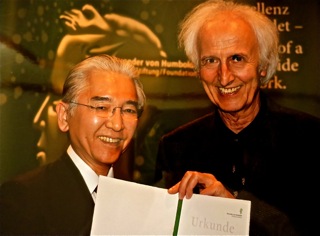Professor Kazunori Kataoka, Graduate schools of Engineering and Medicine, the University of Tokyo, awarded the Humboldt Research Award

Awards ceremony was held on March 23, 2012.
Right: Prof. Helmut Schwarz (President of the Humboldt Foundation)
The Alexander von Humboldt Foundation in Germany announced that this year’s Humboldt Research Award was granted to Professor Kazunori Kataoka of Graduate schools of Engineering and Medicine, the University of Tokyo. Initiated by the Alexander von Humboldt Foundation, an institution funded by the German government, the award is presented to support remarkable international scholarly research where fundamental discoveries or new theories have had a significant impact on the academic disciplines of humanities, social sciences, chemistry, engineering, medicine, or agriculture. Recipients are expected to continue their involvement in cutting-edge research. In addition to the prize, a premium of 50,000 EUR and expenses for accommodations in Germany are provided.
The Humboldt Research Award is most prestigious in Germany; previous award winners include more than forty Nobel laureates and past recipients of the Humboldt Research Award from the University of Tokyo include Dr.Masatoshi Koshiba, a professor emeritus and 2002 Nobel laureate in physics and Dr. Akito Arima, former President and a professor emeritus.
Professor Kataoka received the Humboldt Research Award for his work in polymer chemistry and the new area of nano-medicine where his development of the nanotechnology-based targeting drug delivery system (DDS) is demonstrating the excellent effects of polymer medicines in the treatment of refractory cancer. Professor Kataoka created virus-sized (about 50 nanometer) drug carriers (polymer micelles) by integrating finely synthesized polymeric materials that led to the successful targeted treatment of refractory solid cancer, which is incurable with conventional chemotherapy. Furthermore, Professor Kataoka demonstrated the usefulness of polymer carriers for gene or oligonucleotide delivery. Currently, international clinical studies (Japan, USA, Europe, and Asia) are in the second phase examining polymer micelles with four types of different anti-cancer agents. A breakthrough is expected in the treatment of refractory cancer and pancreatic cancer.
In 2009, Professor Kataoka was selected as one of the top 30 researchers in Japan. He is now leading a major project to develop innovative diagnostics and therapeutic systems based on nanobiotechnology. The project consists of researchers from industries, universities, and research institutes, supported by the Japanese government’s Funding Program for World-Leading Innovative R&D on Science and Technology.
The awards ceremony for the Humboldt Prize will be held on March 23, 2012 in Germany. Professor Kataoka will also attend a reception hosted by the German president at the presidential residence, Bellevue Palace, in June of this year.
Inquiries:
Associate professor Nobuhiro Nishiyama
Graduate school of Medicine
The University of Tokyo
7-3-1, Hongo Bunkyo-ku, Tokyo 113-8656
Tel: +81-3-5841-1430 / Fax: +81-3-5841-7139
E-mail: 
Kiyoko Jarnes
Graduate school of Engineering
The University of Tokyo
7-3-1, Hongo Bunkyo-ku, Tokyo 113-8656
Tel: +81-3-5841-1509 / Fax: +81-3-5841-1510
E-mail: 
Yuko Yamamoto
Japan Science and Technology Agency
NanoBio FIRST research support office
2-11-16 Yayoi, Bunkyo-ku, Tokyo 113-8656
Tel: +81-3-5841-1267 / Fax: +81-3-5841-1510
E-mail: 
![NanoBio First - Funding Program for World-Leading Innovative R&D on Science and Technology_[Development of Innovative Diagnostic and Therapeutic Systems Based on Nanobiotechnology]](../common/img/head_title.gif)